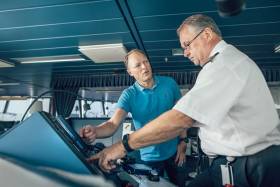Displaying items by tag: AI assisted ships
Launch of Stena Line's First 'AI' Assisted Ferry
#FerryNews - Scandinavian based ferry giant Stena Line is conducting a pilot study in which artificicial intelligence is implemented on board. The use of AI is an important part of the Swedish operators efforts to reduce fuel consumption and environmental impact.
In close cooperation with Hitachi technology company, an AI model is developed to use on board. The model will anticipate the most fuel efficient way of operating a particular vessel on a particular route, and will be a support for captains and pilots.
If the model is successful, it will contribute significantly to achieving the annual goal of reducing fuel consumption on board by 2.5 percent.
"The model goes through a large number of scenarios before proposing the most optimal route and best fuel optimization settings during the trip. Thanks to AI we now have the opportunity to take into account a large number of factors, such as currents, weather conditions, water depth and speed through water in more combinations than previously possible to do manually, says Lars Carlsson, Head of AI on Stena Line .
The model is under development and it would not have been possible to move on in the project without a dedicated captain and crew. Therefore, the pilot study is conducted on board Stena Scandinavica (Afloat adds an enlarged sister of Stena Adventurer on the Irish Sea). The study is been supervisised by Senior Master Jan Sjöström, who has worked with fuel optimization on Stena Line for the past 40 years.
"As the model is still developing, at the moment, it is perhaps more we who assist AI than the other way around, but it's an incredibly fun and rewarding process. We have made adjustments after each trip for about four weeks and it's great to see how fast it learns and constantly improve, "says Jan Sjöström, Senior Master of Stena Scandinavica.
The goal is to create such a model that it can provide an ultimate decision base for the captain and officers on board when planning a trip. For example, if AI could provide accurate predictions about current conditions, which is one of the more complex factors today, it would help even the most experienced captain or mate.
In addition, the model can also contribute to knowledge and knowledge transfer to the next generation.
"Planning a cruise and steering a ship in a safe and fuel efficient way is a craft. Exercise gives skill, but if a new captain or mate is assisted by AI, the person can quickly learn to fuel optimize. This, in turn, contributes to a more sustainable journey, "says Jan Sjöström.
Stena Line has an overall goal that all operations will be assisted by AI in 2021. The pilot study at Stena Scandinavica, which operates the Gothenburg-Kiel route, is the first of several tests with AI assistance aboard in 2018. The project will be evaluated by the end of the year . Thereafter, it is decided how the operator will proceed with the implementation of AI Assistance on its 38 vessels.
"We are proud to work with Stena Line to develop and implement AI technology that will create value for both the company and the environment. By working together, thus combining business expertise with data and AI, Hitachi and Stena Line have managed to show how digitization can be used to optimize existing conditions and thus create better results, "says Ram Ramachander, Chief Digital Officer at Hitachi Europe Ltd .
The ferry operator is already assisted by AI in several areas, such as administration, finance, service and customer experience.
























































